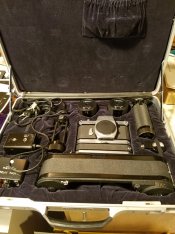Moving this thread to a slightly different direction: How would I dry this film, 250 exposures?
I think I can load it, shoot it, load it to the development drum, develop it .. but then?
Currently I'm drying the films by hanging in the bathroom. Works well for 135/36 and 120. But what can I do with a 250 exps long 135? Cut it into pieces 36 exps or so and continue as usual? Or is there some other good idea?
One method I have used with sprocket holed film, is to make up pairs of film hangers using repurposed paper clips, one on either side, which in turn are held onto a piece of wood using a slim metal plate. Basically you just need enough to hold whatever length of film you are wishing to develop in one piece.
Another alternative, which requires a bit more work to set-up, is to have a number of wheels with an approximate diameter of 80mm to 100mm and a width of around 50mm with a very slight hollow in the centre. The larger the diameter of these wheels, the less stress on the film. By placing these wheels in a line and probably around 300mm to 400mm apart and hung from something, you can loop the film on these. But do ensure the film has the emulsion facing upwards so the rear of the film is touching the rollers. This is a variation of the dip n dunk film processors I used around 30-33 years ago. If you have someone who has a woodturning lathe, they can very easily turn up multiple wheels in an hour or so from almost any wood found around the place. You can seal the wood using almost any kind of house paint (hausfarbe?)
Many houses where you live have a keller, that would be an ideal place to dry film, just ensure no doors are opened during the drying process. Around 36 years ago I was drying some film in a keller in Schwabia and I suddenly heard a rumbling kind of noise, I was then gaily told this was a delivery of coal for the heater. I was mortified, but things turned out alright, there was no coal dust on the films
I at one stage in the tropics, strung lengths of film between trees to dry, if the weather was humid, dust problems were almost non existent.
Mick.













